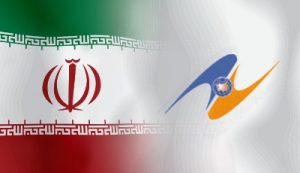Iran & EAEU Agree On Free Trade; China, India, Mongolia, Pakistan, Singapore, South Korea & Thailand Set To Follow
 Iran and the EAEU have completed negotiations on Free Trade and are expected to sign off on the deal at the next EAEU meeting in Moscow in October. Iran and the EAEU will observe the basic principles of World Trade Organization protocols and create the proper conditions for trading all goods in the framework of commerce collaborations, the EAEU press office reported.
Iran and the EAEU have completed negotiations on Free Trade and are expected to sign off on the deal at the next EAEU meeting in Moscow in October. Iran and the EAEU will observe the basic principles of World Trade Organization protocols and create the proper conditions for trading all goods in the framework of commerce collaborations, the EAEU press office reported.
Armenia, Belarus, Kazakhstan, Kyrgyzstan, and Russia are the current member states of the union, with a combined GDP of US$2.2 trillion; US$ 3.1 trillion of industrial products; and US$877 billion worth trade with non-member countries – equal to 7.3 percent of world exports and 3.2 percent of world imports.
The Iran deal will allow for Iran’s large and high quality agricultural sector to export fruit and vegetables, including potentially huge agreements with Russia’s large chain stores for summer fruits and vegetables in the long term.
“Iran maintains good trade and economic relations with all the States of the EAEU. For this reason we have every reason for the formation of effective cooperation,” said the Ambassador of the Islamic Republic of Iran to the Russian Federation.
![]() Related: Advancing Russian Free Trade with Asia, China, & the Pacific
Related: Advancing Russian Free Trade with Asia, China, & the Pacific
The Iran / EAEU deal is a good example of how free trade is starting to develop under the regeneration of the Silk Road. Although the agreement is not an “OBOR” deal per se as it does not include China, it does illustrate the impact that the Chinese and Russian initiatives are having in terms of setting out their respective positions on both the Belt and Road and the Eurasian Economic Union respectively.
Other OBOR nations are also eyeing Free Trade Agreements with the EAEU, including important transit nations such as Mongolia, Pakistan, Thailand, and Serbia as well as major Asian economies such as South Korea and Singapore. Both India and China are already well underway with FTA negotiations with the EAEU while Vietnam became the first Southeast Asian nation to complete a full Free Trade Agreement back in 2015. That deal has already realized some US$10 billion of investments into Vietnam in 18 months from a base of close to zero.
“The activities of the EAEU are well worth watching out for”, says Chris Devonshire-Ellis of Dezan Shira & Associates. “The trade impact of the various FTAs being signed off with the bloc are already changing the face of the Eurasian supply chain and will make new markets accessible. Eastern European, Middle Eastern, and Asian governments as well as MNCs should be monitoring the progress of this and examining both how to become involved and how to take advantage of this new geopolitical raising of trade barriers. The entire Eurasian land mass is starting to become far more accessible and businesses need to position themselves to take advantage of the new opportunities and challenges this emerging market will bring”.
About Us
Silk Road Briefing is published by Asia Briefing, a subsidiary of Dezan Shira & Associates. We produce material for foreign investors throughout Eurasia, including ASEAN, China, India, Indonesia, Russia & Vietnam. For editorial matters please contact us here and for a complimentary subscription to our products, please click here.
Dezan Shira & Associates provide business intelligence, due diligence, legal, tax and advisory services throughout the Asian and Eurasian region. We maintain offices throughout China, South-East Asia, India and Russia. For assistance with OBOR issues or investments into any of the featured countries, please contact us at silkroad@dezshira.com or visit us at www.dezshira.com
 Related Reading:
Related Reading:
Silk Road and OBOR Business Intelligence
Dezan Shira & Associates´ Silk Road and OBOR investment brochure offers an introduction to the region and an overview of the services provided by the firm. It is Dezan Shira´s mission to guide investors through the Silk Road´s complex regulatory environment and assist with all aspects of establishing, maintaining and growing business operations in the region.
China’s New Economic Silk Road
This unique and currently only available study into the proposed Silk Road Economic Belt examines the institutional, financial and infrastructure projects that are currently underway and in the planning stage across the entire region. Covering over 60 countries, this book explores the regional reforms, potential problems, opportunities and longer term impact that the Silk Road will have upon Asia, Africa, the Middle East, Europe and the United States.
![]() Establishing a Foreign Business in Russia
Establishing a Foreign Business in Russia







